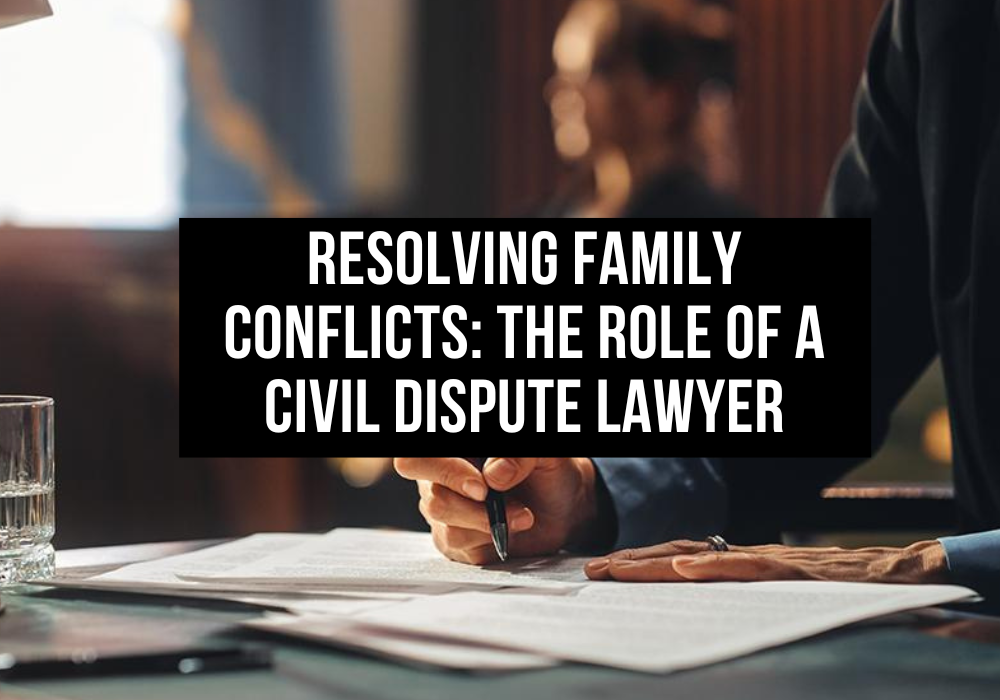In the intricate web of family dynamics, conflicts can arise that seem impossible. Whether disagreements over property, custody battles, or financial disputes, these conflicts can strain relationships and disrupt daily life. This is where the expertise of a civil dispute lawyer comes into play, offering not just legal solutions but also a pathway to peace and resolution within the family unit.
Understanding the Role
A civil dispute lawyer specializing in family matters plays a pivotal role in resolving conflicts through legal means. Their role extends beyond mere legal representation; they act as mediators, advisors, and advocates for their clients. Here’s a closer look at how they navigate the complexities of family conflicts:
- Legal Representation: One of the primary roles of a civil dispute lawyer in family conflicts is to provide legal representation to their clients. This involves understanding the legal framework related to family law, including property rights, child custody, divorce proceedings, and more. By leveraging their legal expertise, they can effectively represent their client’s interests in court or during negotiations.
- Mediation and Negotiation: Civil dispute lawyers are skilled mediators and negotiators. They strive to find amicable solutions to conflicts without resorting to lengthy, expensive court battles. Mediation sessions facilitate constructive communication between parties, helping them reach mutually acceptable agreements. This approach saves time and money and fosters a more cooperative atmosphere, which is essential for maintaining family relationships.
- Legal Advice: Another crucial aspect of their role is providing legal advice to clients. They assess the legal implications of various courses of action, educate clients about their rights and responsibilities, and offer strategic guidance on navigating complex legal processes. This ensures clients make informed decisions aligning with their best interests and long-term goals.
Real-Life Example: The Smith Family Dispute
Consider the hypothetical case of the Smith family. After their parents’ passing, the siblings, John and Emily, found themselves in a bitter dispute over the division of the family estate. John believed he was entitled to a larger share based on his contributions to the family business, while Emily insisted on an equal split as per their parents’ wishes.
Read: The Impact of Social Media Evidence in Family Law Cases
The Intervention of a Civil Dispute Lawyer
- Initial Consultation: After consulting a civil dispute lawyer specializing in family law, John and Emily underwent an initial consultation. The lawyer listened attentively to their concerns, gathered relevant information about the estate, and explained their legal options.
- Mediation Sessions: Recognizing the emotional strain and complexity of the situation, the lawyer recommended mediation sessions for John and Emily. During these sessions, facilitated by the lawyer, both parties could express their viewpoints, understand each other’s perspectives, and explore potential compromises.
- Legal Representation: As negotiations progressed, the civil dispute lawyer represented John, ensuring that his rights and interests were protected throughout the process. This included drafting legal documents, reviewing agreements, and advocating for fair outcomes on John’s behalf.
- Resolution and Closure: Through diligent mediation efforts and legal expertise, the civil dispute lawyer helped John and Emily reach a settlement agreement that addressed their concerns equitably. The division of the estate was finalized without the need for costly litigation, preserving family ties and fostering a sense of closure for both siblings.
Key Benefits of Hiring a Civil Dispute Lawyer
- Expertise in Family Law: Civil dispute lawyers specializing in family matters have in-depth knowledge of family law statutes, precedents, and legal procedures.
- Conflict Resolution Skills: They possess intense mediation and negotiation skills, essential for facilitating productive discussions and reaching fair agreements.
- Legal Strategy: They develop customized legal strategies tailored to each case’s unique circumstances, maximizing favorable outcomes for their clients.
- Emotional Support: Civil dispute lawyers offer empathetic support and guidance beyond legal matters, acknowledging the emotional impact of family conflicts.
- Cost-Effective Solutions: By prioritizing mediation and out-of-court settlements, they help clients avoid prolonged litigation, saving time, money, and stress.
Conclusion
A civil dispute lawyer is a beacon of hope in family conflicts, guiding individuals and families toward resolution, understanding, and closure. Their multifaceted role combines legal expertise with compassion and pragmatism, ultimately contributing to restoring harmony within the family unit. When faced with familial disputes, seeking the assistance of a skilled civil dispute lawyer can pave the way for a brighter, more harmonious future.

